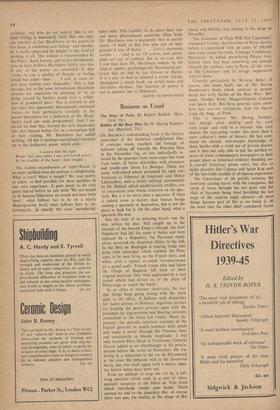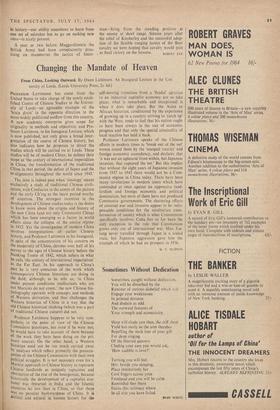Business as Usual
Battles of the Boer War. By W. Baring Pember- ton. (Batsford, 25S.) DR. BALMER'S undemanding book is the literary equivalent of the historical compilation film. It contains much excellent old footage of balloons taking off towards the Prussian lines in the November fog, of rats individually se- lected by the gourmet from mass cages like trout from tanks, of brave skirmishes with chasse pot and needle-gun about Le Bourget. There are many well-edited pieces presented by such eye- witnesses as Edmond de Goncourt and Henry Labouchere, and a nicely tailored commentary by Dr. Baldick which unobtrusively enables you to concentrate your whole attention on the spec- tacle. But it is no more than a spectacle. If there is indeed more to history than human beings making a spectacle of themselves, this is not the place to look for it. On the other hand, what a spectacle this was.
Not the least of its amazing details was the play within the play. Still caught up in the charade of the Second Empire (though 'the little Napoleon' had left the scene at Sedan and been replaced by a Republic), the Parisians them- selves savoured the theatrical effects to the full. In the Bois de Boulogne a roaring trade was done with telescopes which enabled the Prus- sians to be seen firing on the French forts, and when, after a typical so-called 'reconnaissance on a grand scale,' French troops who had taken the village of Bagneux fell back to their original positions 'they were, applauded by a vast crowd which had driven on to the plain of Montrouge to watch the battle.'
As so often at amateur theatricals, the fact that things keep going wrong with the show adds to the effect. A balloon with dispatches for T.ours arrives in Norway; ingenious devices for keeping the postal services open with the provinces by dog-postmen and floating canisters committed to the Seine fail totally. More im- portant: the periodic reluctant attempts of the French generals to match bombast with deeds and make a sortie through the Prussian lines end consistently in bloody ineptitude. 'I will only re-enter Paris Dead or Victorious,' General Ducrot added as an afterthought to his procla- mation before the sortie of November. He was dining in a restaurant in the rue dc Miromesnil at the time. He behaved well in the disastrous battle, but was back again with a hearty appe- tite before many days were out.
Even an attempt to stop the rot by a left- wing patriotic revolt ends in a sort of chim- panzees' tea-party at the Hotel de Ville from which everybody simply goes home. There seemed no end to the absurdity. But, of course, there was one, for reality, in the shape of Bis- marck and Moltke, was waiting in the wings at Versailles.
'The Governor of Paris Will Not Capitulate,' trumpeted Trochu, the Governor of Paris, shortly before it capitulated with an army of 300,000 men intact inside the walls. 'Courage, Confidence, Patriotism,' he added, pre-echoing Main. And, indeed, there had been something real enough beneath the surface, even in Paris, all the time, as the Commune and its savage suppression were to show.
Generals, particularly Sir 'Reverse' Buller, of course, also come badly out of Mr. Baring Petnbcrton's book which analyses in minute detail live early battles of the Boer War: Bel- mont, Modder River, Maggersfontein, Colenso and Spion Kop. But these generals seem some- how less way-out caricatures than the figures from- the Siege of Paris.
This is because Mr. Baring Pember- ton,- though often dealing yard by yard with kopje and veld in a manner that may dismay the easy-going reader, has more than a mere collector's sense of history. He has com- bined his already microscopic knowledge of these battles with a vivid use of private diaries, and is thus not only able to put the garbled re- ports of many contemporary newspapers in their proper place as historical evidence (budding do- it-yourself historians please note), but also to make disasters like Colenso and Spion Kop part of the inevitable muddle of all human experience.
The frustrations of the prickly mimosa, the ironstone causing havoc with the compasses, the swish of boots through the wet grass and the click of bayonets being fixed heralding the last stage of the surprise night advance—all these things become part of life as we know it. At the same time the other chief continuoui factor
in history—our ability sometimes to learn from one set of mistakes but to go on making new ones—is nicely present.
A year or two before Maggersfontein the British Army had been complacently prac- tising on manoeuvres the tactics of Inker- man—firing from the standing position at the enemy at short range. Sixteen years after the relief of Kimberley and the successful adop- tion of the flexible ranging tactics of the Boer cavalry we were hoping that cavalry would gain us final victory on the Somme. ROBERT K EE

























 Previous page
Previous page